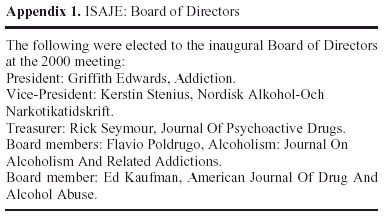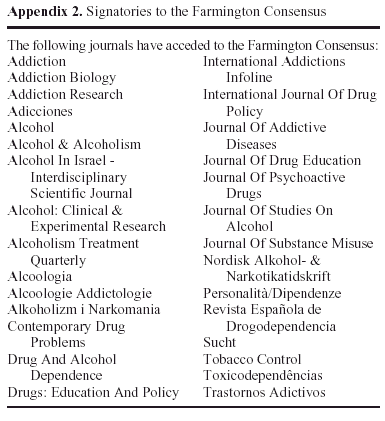There is a set of recurrent problems which affect journal publishing. They are matters which perplex editors, and authors and readers have a right to know that these problems are being responded to consistently and well. Examples? Here are just a few illustrations of the kinds of issue we are talking about and which cry out for attention. A paper is rejected because of a biased evaluation by a reviewer who has an obvious but undeclared conflict of interest; important findings are published in a non-English language journal, but remain for years uncited because the journal is not listed in Current Contents (the story of the foetal alcohol syndrome provides a cogent example); a report is rejected sequentially by three different journals because of irremediable shortcomings in the study's design, and is then published in a fourth journal without a word altered or the slightest sign of response to the criticisms made. Such happenings are encountered across every scientific field, but addictions publishing faces additional challengesissues relating to industry interference with research and publishing that create a unique set of problemsin rather special degree [Babor, Edwards and Stockwell 1996).
To work out how better to deal with these problems and get agreed and transparent policies in place which are proactive rather than each new instance having to be dealt with on an ad hoc basis, an organisational strategy which common-sense would surely recommend, is to get addiction journals working together so as to determine common solutions to their common problems.
At Thus to a meeting kindly hosted by the Faculty of Public Health, Jagellonian University, Krakow in july 2000, and with Professor Jolanta Jaworek acting as host, where something happened of potentially great importance for the future of addiction journals. A group of 35 persons representing 23 such journals (many other journals were in supportive contact and asked to be kept informed) together with a representative from SALIS («the Substance Abuse Librarians and Information Specialists») got together and agreed on a set of bylaws. These bylaws give reality, form and future to a society which in Article II defines its mission in the following terms:
«The Society's mission is to promote excellence in the communication of scientific information on addiction and related subjects.» The Society exists to serve its members in the international scientific publishing community by fostering education, discussion, networking, and exchange, and to be an authoritative resource on current and emerging issues in the communication of information on scientific and other types of scholarly publishing in the addiction field, so as to better meet the needs of the authors and readers of addiction journals and the public at large.
«The specific purposes of the Society are to1 facilitate cooperation and communication among editors of addiction journals in different parts of the world, and in different languages2, improve editorial standards and promote professionalism in addiction editing through education, self-criticism, and self-governance3, promote research in peer review and addiction editing, and4 facilitate and support the use of new information technologies in the field.»
In these paragraphs this text is enshrined a clear intention that ISAJE will aim very practically to make the international journal publishing enterprise in this specialist field more efficient, effective and ethically aware, and thus in general better able to serve the public good. Journals help make and define a specialist field and working together is likely to be much more productive than isolation. The establishment of this new editorial network specifically for the addictions reflects a wider trend in medical and scientific publishing for sectorally defined journals to establish specialist interest groups.
The adoption of the bylaws has formalised developments which have been in progress over the three years preceding Krakow. The start had been a meeting held in Farmington, Connecticut in july 1997 and hosted by Thomas F. Babor (Addiction's Regional Editor for the Americas) (Edwards et al 1997) which resulted in publication of the Farmington Consensus (Farmington 1997). It was noted at the time (Edwards et al 1997) that:
«Out of amazing diversity a unity of purpose is beginning to be defined. A single meeting or consensus statement may in retrospect be seen as steps along the way, but it is commitment to the process which matters.»
The process has gone forward through a july 1999 meeting in Florence hosted by Cristina Calzolari and Valentino Patussi (Alcoologia) and by means of much between-meeting consultation. In the lead up to Krakow, valuable work was done by Thomas Babor and by Robert Balster (Drug and Alcohol Dependence) in developing the bylaws document up to a stage where it could be presented and debated.
At Krakow rules for membership and voting rights were agreed, the procedures for election of Officers and a Board of Directors got in place, and many other usual and necessary ground rules for the establishment of any professional association. It was however only after Krakow that consultations secured consensus on the name of the society: some delegates thought the word «addiction» an insufficient description of our concerns, but no one could identify a better word or phrasing likely to be internationally intelligible. It has been agreed decided that for the next two years the administrative office of ISAJE will be located at the offices of Addiction (National Addiction Centre, London), with Susan Savva as executive officer.
The next plenary meeting will take place in the summer of 2002 but ISAJE will meanwhile very actively pursue a number of lines of activity through working parties constituted to study and report on, respectively: Ethics, Education and Training, and the special problems often confronting Non-English language journals. ISAJE intends to embrace a style which is action-orientated, participatory and democratic. We intend sturdily to protect our independence from trade influences.
This initiative has come a long way over the last three years and there is much further work to be done. The augurs for the future of ISAJE look favourable and will build on an invaluable asset, already created, of commitment, trust and friendship. Not unexpectedly, time-out together is important, as well as the formal meetings. Working together we expect to be better able to serve the cause of addiction science than would ever be the case if we remained isolated. The worth of the enterprise and its ability to meet the group's ambitions will be determined by the outcome of the work in hand and no doubt also by much work further down the road, but today ISAJE has a shared sense of mission and a keen sense of future.






